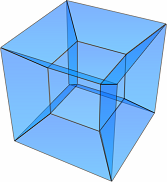To deepen our understanding of reality, we need to examine the building blocks that constitute our idea of it. Concepts are the way in which we define the world to ourselves and others, and these little cognitive units of meaning are what makes knowledge and reason possible. To understand them is to understand our thinking, and that is essential to our inquiry into the truth.
Concepts are units of knowledge associated with a corresponding representation in language or some other symbolism such as mathematics or logic. They are words we attach to meaning, and the meaning to which they refer is derived from direct perception and experiences. Concepts are what enable us to reason, think, and communicate, and when combining them we can imagine things that do not exist at all. Unicorns is nowhere to be found in the world, yet we can envisage them by combining concepts already abstracted from experience such as colors, shape and form.
We cannot communicate experience directly. It cannot be transferred to another person for re-viewing. If we want to share it with others we need to give them a symbol, a word, to then interpret in relation to what they are already familiar with: their own perceptions and experiences. The concept is what reminds us of knowledge that we already have.
We create a concept by assigning a word for a particular perception or experience. As a child we are told the names of things by our parents. We learn by associating the name to the thing and hence an empirical concept is formed. Eventually our vocabulary and understanding is mature enough to learn higher-order abstractions: concepts that contain other concepts.
A concept generally has empirical content, pointing to a direct experience or perception, but a higher order concept is a further abstraction, instead referring to another concept. We can illustrate this using the word “number”. The number three can symbolize any group of objects with three members: three elephants, three cars or three apples. This can be shown directly in experience; you can point to the apples and say “three”. A variable however, is a higher order concept and can symbolize any number but only has empirical content indirectly. Explaining the variable won’t do any good unless your friend first has a solid understanding of the concept “number”. Another example is the word “Society” which can symbolize any group of people, but has without the concepts “group” and “people” by itself no empirical content.
But no matter how complex a concept you create, how high the abstraction runs, its whole pyramidal structure rests on a base of direct experience. The higher-order concept cannot refer to anything empirically different then the total content of the perceptions from which the concepts it relies on were derived. In short, all concepts ultimately point to direct experience and nothing else. The entirety of human knowledge – all science, logic and mathematics, all language and common sense – can have no more content than is contained in the sum of the perceptions from which the concepts that constitute this knowledge were formed. And thus, the perceptions and experiences from which these concepts are drawn are the real content of our thinking.
All mental representation will always be limited in the sense that we cannot form an idea of something that was not previously experienced. Yes, you can imagine objects like unicorns and black rainbows even though you never seen those, but those representations are formed by combining other concrete concepts like colors, shape and form – all which are derived from experience. Imagining a four-dimensional hypercube is impossible, for we have not and cannot come in contact with such a creation. However, we could imagine a two- or three-dimensional representation of that cube. This will not be a real hypercube but a representation we can conceive. But like the unicorn, it is composed of concrete experiences like colors and lines.
 The image to the right is in fact a two-dimensional projection of a three-dimensional representation of a four-dimensional hypercube.
The image to the right is in fact a two-dimensional projection of a three-dimensional representation of a four-dimensional hypercube.
We cannot represent something to ourselves that has never been perceived. The word red has no meaning to a person born blind. A deaf person cannot understand the word melody other than in concepts known to him, such as “something non-deaf people experience”, and no matter how well-explained by others, “Melody” will remain an empty word to him. Conception in terms of unperceived experience is impossible for the simple reason that we haven’t experienced such terms.
Our understanding of the world is in the medium of concepts. They are derived from phenomena on the veil of perception and therefore, the real content of our thinking is in terms of the experiences and perceptions appearing on it. Thus, there are no objective concepts at all. Concepts are entirely subjective – they are always referring to our direct experience.
This is the second article of a four part series. Please continue to read here.